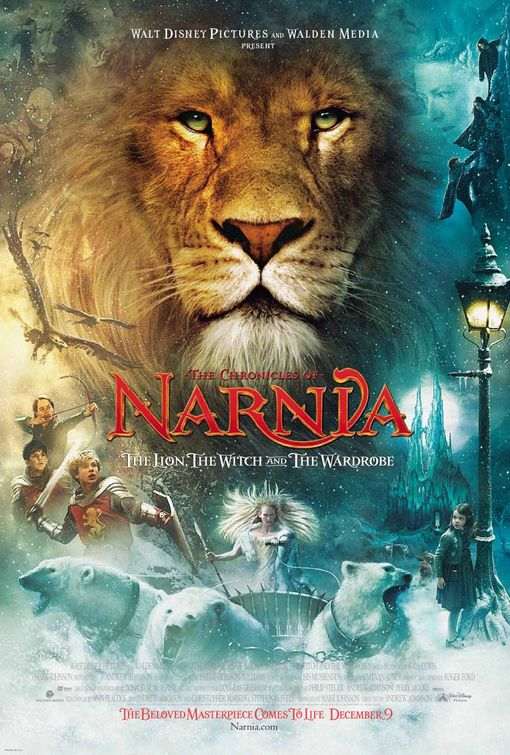“Absolutely Thrilling!”

| None | Light | Moderate | Heavy | |
|---|---|---|---|---|
| Language | ||||
| Violence | ||||
| Sex | ||||
| Nudity |
What You Need To Know:
Despite some minor changes from the book, THE LION, THE WITCH AND THE WARDROBE is tremendously exciting, thrilling and redemptive. Though some things have been deleted from the book and other things have been added, the movie retains most of its Christian focus. The resurrection of Aslan breaks the power of the White Witch over Narnia. Those who love Narnia can rejoice that the movie tells this story in a very entertaining and respectful way.
Content:
(CCC, BBB, PC, Fe, VV, D) Very strong Christian worldview with clear incarnational allusions to the death and resurrection of Jesus Christ as the only way to break the power of sin and defeat the powers of darkness, slightly mitigated by a strong empowering of human beings and a very slight failure to include the full sacramental references of the book and the Creator references to the Emperor-Beyond-the-Sea, as well as a couple of politically correct nods, including a statement dismissive of war, a nod to defining the contents of a healing potion given to Lucy, a modernist view of women in allowing Susan to fire a bow and arrow in war, and a slightly attenuated mention of the Creation, not the Creator, in the coronation of the four children (these discrepancies are all very minor, however, because they are presented in a context where the Christian perspective of the novel dominates); no foul language; action violence and scary creatures that may be too frightening for younger children, including bombing of London, battles with wolves, swordfights, ugly creatures, the witch stabs Aslan to kill him, and many battle scenes; no sex; minor upper male nudity; no alcohol; smoking a pipe; and, nothing else objectionable.
More Detail:
In this regard, C. S. Lewis wanted the story to get past the “watchful dragons” of young minds trained by an increasingly secular British culture to help the readers understand the good news of Jesus Christ. He revealed his method in his March 1961 letter to a young girl named Anne:
“I think you will probably see that there is a deeper meaning behind it. The whole Narnian story is about Christ. That is to say, I asked myself ‘Supposing that there really was a world like Narnia and supposing it had (like our world) gone wrong and supposing Christ wanted to go into that world and save it (as He did ours) what might have happened?’ The stories are my answers. Since Narnia is a world of Talking Beasts, I thought He would become a Talking Beast there, as He became a man here. I pictured Him becoming a lion there because (a) the lion is supposed to be the king of beasts; (b) Christ is called ‘The Lion of Judah’ in the Bible; (c) I’d been having strange dreams about lions when I began writing the work. The whole series works out like this.
The Magician’s Nephew tells the Creation and how evil entered Narnia.
The Lion etc the Crucifixion and Resurrection.
Prince Caspian restoration of the true religion after corruption.
The Horse and His Boy the calling and conversion of a heathen.
The Voyage of the “Dawn Treader” the spiritual life (especially in Reepicheep).
The Silver Chair the continuing war with the powers of darkness.
The Last Battle the coming of the Antichrist (the Ape). the end of the world and the Last Judgement.
Source: “Bluspels and Flalansferes: A Semantic Nightmare,” in Selected Literary Essays, Walter Hooper, ed. (London: Cambridge University Press, 1969), 426.
Very, very few people will see the slight divergences that the movie takes from the novel. And, even fewer will see the few very subtle theological shifts in the new movie. So the great news is that the movie works well and is a great tool for the Church to help people understand the truth of the Gospel of Jesus Christ.
The movie itself starts slightly before the book with an air raid in London that puts the four Pevensie children, Peter, Susan, Edmund, and Lucy, in jeopardy. The children are sent out of the city to stay with Prof. Kirke in the countryside for protection.
During a game of Hide and Seek, Lucy stumbles on an old wardrobe. The wardrobe leads her to Narnia, a world with talking animals and mythical creatures. There, she meets a faun, who thinks better of kidnapping her and puts his life in jeopardy by letting her return to the world of men. The evil White Witch has taken control of the land, turning it into a state of forever winter but never Christmas. A prophecy says that four sons and daughters of Adam and Eve will be brought to Narnia to assist Aslan, the son of the Emperor-Beyond-the-Sea, free Narnia from the White Witch. To thwart the prophecy, the White Witch has told the creatures of Narnia that, if they see a son or daughter of Adam and Eve, they should kidnap and bring them to her.
When Lucy returns to the world of human beings, her brothers Edmund and Peter and her sister Susan do not believe she was in Narnia. Lucy goes to Narnia through the wardrobe a second time. Edmund follows her and becomes a pawn of the White Witch. Like Satan, the White Witch offers Edmund something that he already has, the authority to rule Narnia, and traps him with a counterfeit sacrament of Turkish Delight, a jelly confection dusted with sugar. Edmund’s sisters and brother must find Aslan to try to set him free. Aslan tells the White Witch that he will die to pay the penalty for Edmund’s treachery, but not that his resurrection will once and for all break her control over Narnia.
THE LION, THE WITCH AND THE WARDROBE is very exciting. The excitement is heightened by a compelling sense of Providence leading the children into Narnia and the foreshadowing of the prophetic expectations.
The production quality is much greater than the sum of its parts. The camerawork is superb. The computer generated images are enchanting. Aslan comes to life in a magnificent way (he is a real lion!), as do all the creatures of Narnia. The four children are very good, especially Lucy, and the only regret is that Peter and Susan are not given meatier lines. Ms. Swinton would have been a better White Witch if she had been allowed to be more seductive, but her costume often cocoons her personality. The music is good, though not great. The direction is very exciting and entertaining, though it lacks nuance and depth. But, aside from critical nitpicking, the movie is spectacular! C. S. Lewis never wanted a movie made of his books, but one can even imagine that he would be proud of this production, and so everyone involved deserves high praise.
As noted, the movie has retained its theological foundation, even though the filmmakers have deleted some important scenes that are in the book and added others that seem trivial. Even so, some of the theology has been toned down. These changes are subtle, with a little more emphasis on the Creation rather than the Creator. There are no direct references to the Emperor-Beyond-the-Sea, for instance. Also, the sacramental communion banquet with the coming of Father Christmas and the gifts of the Spirit has been truncated into a very brief scene with Father Christmas. Finally, the resurrection romp with Aslan, Lucy and Susan has been eliminated. Thus, the movie focuses more on the children being the solution to the evil in Narnia when in fact the victory is Aslan’s. The children, just like people in our world, are more than conquerors only because they are heirs to the victory that Aslan wins on the stone table. Or, rather, the victory that Jesus Christ won on the cross!
Andrew Adamson said that when he directed the movie, he started from his memory. He felt that the book was too thin, so the movie reflects his memory of the book, not the actual book. He understands the element of sacrifice and redemption, but his concern was for the empowering of the children. Clearly, his perspective helped produce the subtle shift from the great clarity of the book itself, but his love for the original source ultimately keeps the movie on target.
Therefore, you have to be very close to the book and very theologically astute to notice the changes. In fact, the movie is a very clear Christological allusion, or imagining, of the story of Jesus Christ. The minor changes do not take away from that meaning in the book, which lifts up the Son of God, Jesus Christ, as our deliverer from the eternal winter of sin and damnation.
After months of anticipation, those who love NARNIA can rejoice that Disney and Walden have given them a wonderful movie that tells the story in an entertaining, exciting, thrilling, and respectful way.
Please note, however, that there is some action violence and scary creatures that may be too strong for younger children seven and under.


 - Content:
- Content: 




